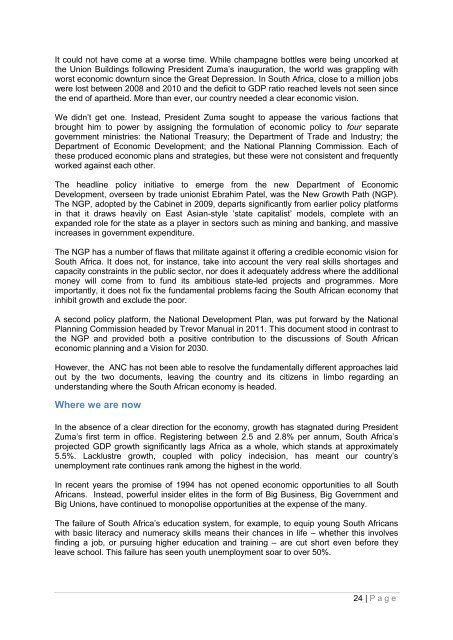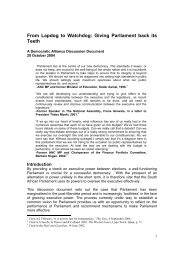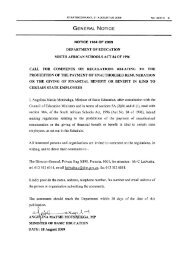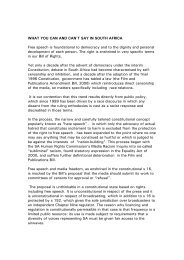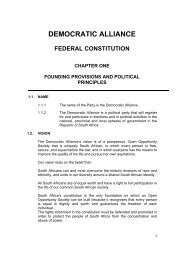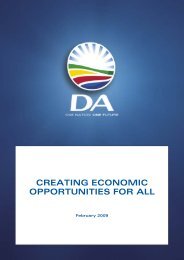DA's Plan for Growth and Jobs - Democratic Alliance
DA's Plan for Growth and Jobs - Democratic Alliance
DA's Plan for Growth and Jobs - Democratic Alliance
Create successful ePaper yourself
Turn your PDF publications into a flip-book with our unique Google optimized e-Paper software.
It could not have come at a worse time. While champagne bottles were being uncorked atthe Union Buildings following President Zuma’s inauguration, the world was grappling withworst economic downturn since the Great Depression. In South Africa, close to a million jobswere lost between 2008 <strong>and</strong> 2010 <strong>and</strong> the deficit to GDP ratio reached levels not seen sincethe end of apartheid. More than ever, our country needed a clear economic vision.We didn’t get one. Instead, President Zuma sought to appease the various factions thatbrought him to power by assigning the <strong>for</strong>mulation of economic policy to four separategovernment ministries: the National Treasury; the Department of Trade <strong>and</strong> Industry; theDepartment of Economic Development; <strong>and</strong> the National <strong>Plan</strong>ning Commission. Each ofthese produced economic plans <strong>and</strong> strategies, but these were not consistent <strong>and</strong> frequentlyworked against each other.The headline policy initiative to emerge from the new Department of EconomicDevelopment, overseen by trade unionist Ebrahim Patel, was the New <strong>Growth</strong> Path (NGP).The NGP, adopted by the Cabinet in 2009, departs significantly from earlier policy plat<strong>for</strong>msin that it draws heavily on East Asian-style ‘state capitalist’ models, complete with anexp<strong>and</strong>ed role <strong>for</strong> the state as a player in sectors such as mining <strong>and</strong> banking, <strong>and</strong> massiveincreases in government expenditure.The NGP has a number of flaws that militate against it offering a credible economic vision <strong>for</strong>South Africa. It does not, <strong>for</strong> instance, take into account the very real skills shortages <strong>and</strong>capacity constraints in the public sector, nor does it adequately address where the additionalmoney will come from to fund its ambitious state-led projects <strong>and</strong> programmes. Moreimportantly, it does not fix the fundamental problems facing the South African economy thatinhibit growth <strong>and</strong> exclude the poor.A second policy plat<strong>for</strong>m, the National Development <strong>Plan</strong>, was put <strong>for</strong>ward by the National<strong>Plan</strong>ning Commission headed by Trevor Manual in 2011. This document stood in contrast tothe NGP <strong>and</strong> provided both a positive contribution to the discussions of South Africaneconomic planning <strong>and</strong> a Vision <strong>for</strong> 2030.However, the ANC has not been able to resolve the fundamentally different approaches laidout by the two documents, leaving the country <strong>and</strong> its citizens in limbo regarding anunderst<strong>and</strong>ing where the South African economy is headed.Where we are nowIn the absence of a clear direction <strong>for</strong> the economy, growth has stagnated during PresidentZuma’s first term in office. Registering between 2.5 <strong>and</strong> 2.8% per annum, South Africa’sprojected GDP growth significantly lags Africa as a whole, which st<strong>and</strong>s at approximately5.5%. Lacklustre growth, coupled with policy indecision, has meant our country’sunemployment rate continues rank among the highest in the world.In recent years the promise of 1994 has not opened economic opportunities to all SouthAfricans. Instead, powerful insider elites in the <strong>for</strong>m of Big Business, Big Government <strong>and</strong>Big Unions, have continued to monopolise opportunities at the expense of the many.The failure of South Africa’s education system, <strong>for</strong> example, to equip young South Africanswith basic literacy <strong>and</strong> numeracy skills means their chances in life – whether this involvesfinding a job, or pursuing higher education <strong>and</strong> training – are cut short even be<strong>for</strong>e theyleave school. This failure has seen youth unemployment soar to over 50%.24 | P a g e


